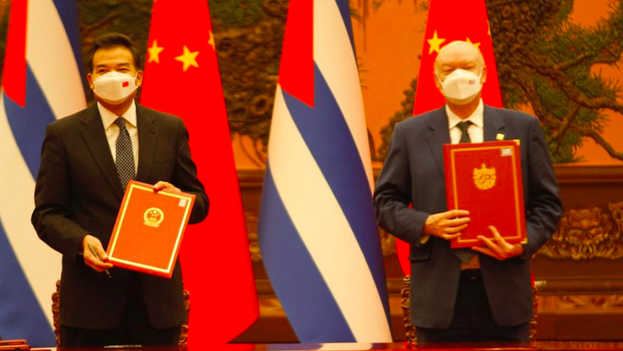
![]() 14ymedio, Havana, 26 November 2022 — In China, the last station of Cuban President Miguel Díaz-Canel’s panhandling tour, the Cuban delegation signed a dozen agreements and appealed to “friendship among the peoples” to extend Havana’s debt terms with Beijing and get an “emergency donation” of about one hundred million dollars.
14ymedio, Havana, 26 November 2022 — In China, the last station of Cuban President Miguel Díaz-Canel’s panhandling tour, the Cuban delegation signed a dozen agreements and appealed to “friendship among the peoples” to extend Havana’s debt terms with Beijing and get an “emergency donation” of about one hundred million dollars.
The negotiations focussed on biotechnology (essential to continue manufacturing vaccines), energy and the most recent obsession of the Cuban regime: cybersecurity and computer surveillance, which will give it more technological resources to control the population and prevent new protests such as those of July 11, 2021.
Locked in a “bubble” against the resurgence of coronavirus that China is going through, Díaz-Canel told the journalists who accompanied him on the trip that the results “are above our expectations.” According to him, Xi told him that “we have to find solutions to all of Cuba’s problems,” despite “the challenges with debt.”
His “small country” — as he has also defined Cuba in front of Putin and Erdogan — will pay, although he is not sure when. We must provide China, he explained, with guarantees to “help our friends feel secure about what we are doing,” because “they’re taking off a little” to accommodate the default on the debt, whose repayment has been impossible since 2019.
Díaz-Canel affirmed that he felt the need to “explain” to Xi the rosary of “involuntary” calamities that have shaken the Island: accidents, hurricanes, coronavirus and, of course, the “hardening” of the US blockade, which has caused a “tense situation” for his government. “It’s not the same when you can talk, when you can explain, when things can be understood from sensitivity,” he said.
The Chinese “are open,” the president concluded, which he interpreted as a sign that his arguments about Cuba’s willingness to accept foreign investment had worked.
Díaz-Canel will return to Cuba with an “emergency cash donation” of about one hundred million dollars, the result of one of the twelve agreements signed with Xi. In addition, there will be another donation of food and medicines, signed by Rodrigo Malmierca, Minister of Foreign Trade and Foreign Investment, who has carried out all the concrete negotiations in Algeria, Turkey, Russia and now China.
Beijing will also offer the Island the indispensable raw materials — in addition to an economic donation — to complete the number of school uniforms for the year that begins next Monday, which will start with a notable deficit of material. Another of the contracts guarantees the supply of “kitchen utensils for high-impact programs.”
Several agreements, the most ambiguous, define a “plan of political consultations” between the Cuban and Chinese Ministries of Foreign Affairs. Signed by Chancellor Bruno Rodríguez Parrilla, it was not explained what the nature of these “consultations” would be, which Cuba will be obliged to offer until 2025. The contract for “exchange and cooperation” between the Cuban Communist Party and the Cuban Communist Party is also political.
The expansion of the new Silk Road and the role of “entry” to Latin America that the Island has were ensured by several “memoranda of understanding,” signed by Malmierca.
In an interview published in Cubadebate, Alejandro Gil, Minister of Economy and member of the Cuban delegation, assured that these agreements are the gateway to “new financing” from Beijing. Funds will be provided to activate the Floating Dam installed in 2019 — essential for the construction and repair of ships on the Island — and to execute a program of “reconversion or modernization” of the Cuban press, one of the main interests of the Chinese Communist Party, according to Gil.
In addition, the financing of a wind energy park, another solar park in Las Tunas and two bio-pesticide plants in Havana and Villa Clara will be explored. And Chinese companies have been invited to make “direct investments” on Cuban territory, the minister said.
The most disturbing agreements, however, are those that promise Chinese aid in the digital and telecommunications fields. In addition to the execution of a “Biocubafarma Cloud Telepresence System,” which promotes digitization in the vaccine and drug manufacturing sector, China signed a project to organize a National Identity System for Natural Persons and another Wireless Network Supervision System.
To both projects — backed by an economic donation — is added a Forensic Data Laboratory that the Government plans to execute. The implications of these contracts for espionage and state surveillance of the Cuban population will be notable, since they guarantee the use on the Island of the digital monitoring systems that Xi Jinping and his Government have been implementing in their own country for years.
With the creation, this Wednesday, of a National Working Group for Cybersecurity, the Cuban regime is taking more concrete steps in the surveillance of the digital environment and Cuban communications. A recent alliance of Xetid, the technology company of the Armed Forces, with Etecsa, makes evident the growing government interest in executing an “offensive” on social networks.
This was confirmed by Cuban Prime Minister, Manuel Marrero Cruz, who together with Álvaro López Miera, Minister of the Armed Forces, organised a cybersecurity workshop to display surveillance equipment — several of Chinese manufacture — that the Government will install on the Island.
Translated by Regina Anavy
____________
COLLABORATE WITH OUR WORK: The 14ymedio team is committed to practicing serious journalism that reflects Cuba’s reality in all its depth. Thank you for joining us on this long journey. We invite you to continue supporting us by becoming a member of 14ymedio now. Together we can continue transforming journalism in Cuba.
